474: Peter John Goy 1938-2021
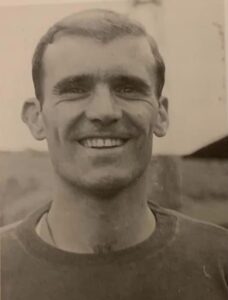
Peter Goy: The Arsenal 1953-1960
The first ever Arsenal Youth team goalkeeper, his chances at Arsenal in the first team were stymied as the side had a surfeit of top class keepers, and in particular Jack Kelsey.

Peter Goy: The Arsenal 1953-1960
The first ever Arsenal Youth team goalkeeper, his chances at Arsenal in the first team were stymied as the side had a surfeit of top class keepers, and in particular Jack Kelsey.
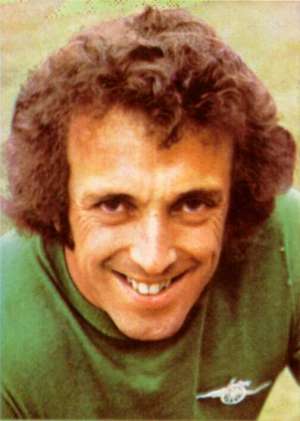
Geoff Barnett: The Arsenal 1969-1976
The long term deputy for Bob Wilson and Jimmy Rimmer in the first half of the 70s, Barnett appeared in the 1972 FA Cup final.
Born in Northwich, Cheshire on 16 October 1946 he was spotted early as a huge talent and became keeper for Mid-Cheshire schoolboys, Cheshire schoolboys and then England schoolboys. Feted by both Matt Busby of Manchester United and Everton’s Harry Catterick, he decided to go with Everton.
On leaving Winsford Grammar school as a 15 year old in July 1962, the club agreed to make arrangements for Geoff to continue his receive schooling due to his young age. Signed professionally in May 1964, he won the FA Youth Cup in 1965 as the Toffees beat the Gunners in front of 30,000 spectators, putting in a performance that ensured Barnett was placed on the Arsenal radar. He also represented England as a youth international on a number of occasions. Promoted to the first team squad he could not displace Blues number one Gordon West and often vied with Andy Rankin as reserve while at Goodison Park, which meant in essence he spent most of his time in the A team.
After ten Everton first team performances, Barnett was purchased on 1 October 1969 for £35,000 by Arsenal manager Bertie Mee, who was looking for a trusted understudy to an injured Wilson. He became the 537th player to don the Arsenal colours when he made his debut a few days later on 4 October 1969 at Highbury in a 1-0 loss to Coventry after which he went on a 13 match run until Wilson returned in December. During this run he played against Sporting Club de Portugal in both legs of the first round at the start of the Fairs Cup winning run, keeping clean sheets on each occasion.
At Highbury like at Everton he did not get many chances, staying in the shadows owing to the excellence of the respective first choices, which was never better displayed than during the 1970/71 double season as he remained in the Combination side owing to Wilson being an ever present for the first team.
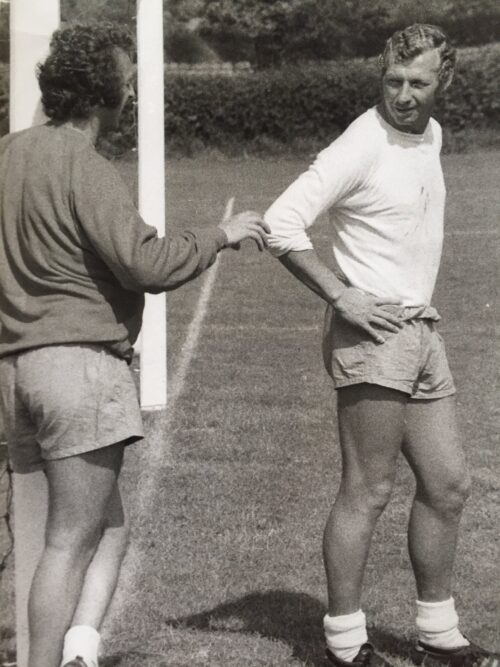
Bob and Geoff.
However at the end of the next campaign, Wilson was badly injured with a torn cartilage in the drawn first Semi-final in April 1972 and faced a long lay-off. This led to Geoff’s longest consecutive string of games for the Gunners and indeed in his top flight career, as he played 30 times at the end of the 1971/72 season and well into the 1973/73 campaign until Wilson regained his place in November 1972. Consequently, this gave Barnett his career highlight as he appeared in the FA Cup Semi-final replay and the FA Cup Final at Wembley of 1972, and picking up a runners-up medal. He had a decent game in the final and had no chance for the one Leeds goal that clinched a boring final.
After this run there were few chances even once Wilson retired, as he was replaced by the exceptional Rimmer. Interestingly of all the goalkeepers who played for Arsenal at least 40 times he has conceded the fewest goals per game at 0.78. A great statistic for a reserve!
His final game came on 13 Dec 1975 at Stoke, and in all made 49 first team appearances, kept 23 clean sheets conceding 38 times. Additionally he played 191 reserve games including gaining a Football Combination Cup Winners medal 1969/70.
A keen cricketer he played for a number of local sides. Additionally he appeared in the North London Derby Cricket contest in 1973 as Arsenal beat Tottenham at Finsbury Park in aid of the Woodberry Down Boys Club. John Radford and Charlie George opened the innings, Bob Wilson kept wicket, with amongst others Peter Storey, Peter Simpson, Bob McNab, and his old Everton team mate Alan Ball donning their whites. Bertie Mee and Spurs manager Bill Nicholson acted as umpires.
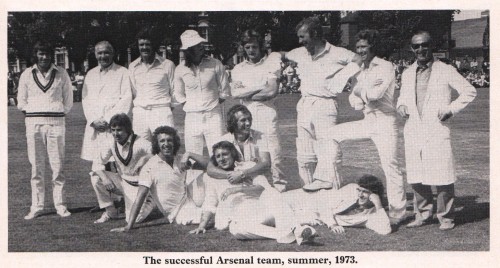
Geoff Barnett sitting in the front row, second from left.
He left Highbury in February 1976 to take on the tenancy of the Waggon and Horses in Watton at Stone, Hertfordshire. Additionally he signed for the Minnesota Kicks for whom he played and coached until 1981 when they folded as a football concern. From here on he moved between the two countries, running a restaurant in America, and pubs in England including the George & Dragon, Holmes Chapel, Cheshire.
He had moved back to the USA, where he died on 15 January 2021 in Florida.
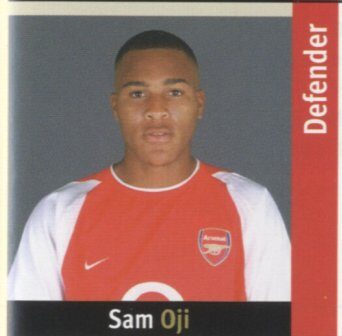
Samuel Oji: The Arsenal 2000-04
A strong physically imposing defender who played in over 60 youth games, and a handful of reserve outings, for The Arsenal around the start of the Millenium.
Born on 9 October 1985 in Westminster, Sam was spotted as a youngest and as a schoolboy made eight and nine appearances for the Arsenal U17s in 2000/01 and 2001/02 respectively. He impressed and was signed into the Arsenal academy in the summer of 2002 as a Central defender. During 2002/03 he became a major feature of the U17 side turning out 19 times, and also played five times for the Arsenal U19 side. In the next season Oji graduated to be a mainstay of the U19 side playing 23 times, and additionally in 2003/04 made four Arsenal reserve appearances.
However, he did not remain at Highbury instead signing his first professional contract with Birmingham City in the summer of 2004, and spent four years at the Blues, making one first team appearance. Whilst there he also had loan spells at Doncaster Rovers making five apps in 2005/06, Bristol Rovers appearing five times in 2006/07 and four times for Leyton Orient 2007-08. He joining the O’s permanently later in the same season and added 11 more performances, making 15 in all.
At Hereford in 2008-09 he made five appearances, before a serious knee injury effectively ended his career as an English league professional footballer. In 2009 he tried out at Swedish side Ljungskile, but his knee injury morphed into cruciate ligament damage and was so serious it prevented him from playing for two years. After recovery he joined Tamworth in 2011 and while there he turned out 39 times in two seasons.
Oji spent time in Ireland with both Limerick in 2013 and Galway in 2015, returning to England with Worcester City in 2016, Hednesford Town in 2017 before joining Highgate United in 2018. The Captain of Highgate United he had recently been made assistant manager at his death on 28 August 2021, aged 35.
Arsenal Handbook – 2002/03, 2003/04, 2004/05
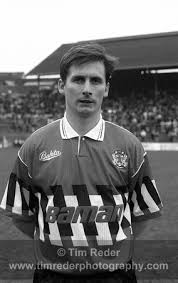
Glenn Roeder: The Arsenal 1971-72
Glenn Roeder made a half-a-dozen youth team appearances at Arsenal before leaving the club in 1972, returning to the Gunners for an impromptu cameo at the end of the 1977/78 season. Subsequently in a long career he went onto make over 600 competitive appearances as a player. An elegant, cultured ball-playing centre back, who often played as a sweeper, he was famous for the “Roeder Shuffle” which was executed by way of a smart step-over often springing defence into rapid attack. Later he had spells as manager in charge of a number of clubs for over 400 games; in short a true football man.
Born 13 December 1955 in Woodford, Essex, Roeder represented both Essex and London schoolboys at football. Though not listed in the official Arsenal handbook as an apprentice at the start of the 1971-72 season, he was at the club as a youth during that season alongside Liam Brady. His first Arsenal game was a colt side friendly against Dulwich Hamlet on 7 August 1971 and his last match was in the South East Counties League versus Reading on 15 Jan 1972. Roeder made four competitive appearances and played in two friendlies for the colts between August 1971 and January 1972, scoring once against Charlton on New Years Day 1972. Consequently, by dint of his few games Glenn assisted Arsenal in winning the South East Counties league that season.
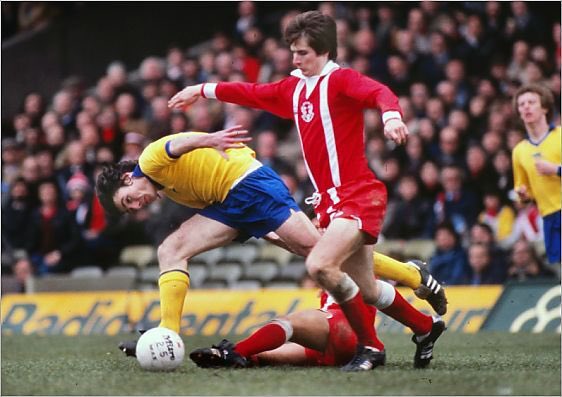
Glenn Roeder takes the ball from Frank Stapleton during the 1978 FA Cup Semi-final
Taken on as an apprentice by Leyton Orient in the summer of 1972, he signed professional terms for Orient in October 1973. Part of the ‘O’s team that reached FA Cup Semi final in 1978, only to be despatched by the Gunners at Stamford Bridge with a brace by Malcolm MacDonald. In hindsight Arsenal may as well have allowed Orient to get to their first final, as they couldn’t have performed any worse than the Gunners did at Wembley, and may well have beaten Ipswich. He represented England in the ‘B’ international team for six games, five of which came in this time at Orient.
Given a surprise guest role in the Arsenal defence on 12 May 1978 for the John Pratt Testimonial, he helped the Gunners to a 5-3 victory at Tottenham. The Spurs side contained Jimmy Greaves, while Arsenal saw a return to the ranks for Frank McLintock and John Radford, alongside Roeder.
Queens Park Rangers paid £250,000 for him and he was greeted by caretaker manager Alec Stock in August 1978. However, a few months into his contract he put in a transfer request as he was rarely used in the first half of the season by new manager Steve Burtenshaw. The conflict bubbled on and only ended after Burtenshaw (who earlier in the 70s was at Arsenal at the same time as Roeder) left the club in May 1979. Thriving under first Tommy Docherty and then Terry Venables, Glenn was made captain. Rangers reached the FA Cup final in 1982, and while appearing at Wembley, he missed leading out the side for the replay due to ludicrous FA suspension rules. A season later in 1982/83 QPR won the old Second Division title, but Roeder was mainly in the reserves that season, owing to long term injury, as they also won the Combination title.
Loaned to Notts County, then a top flight concern, for a month in November 1983, where he was immensely popular not least because they were unbeaten with him in their side! At the end of the loan supporters raised £30,000 in 36 hours for a transfer fund but it was not enough and, after 181 appearances for the Rs, Newcastle United paid £120,000 for him in December 1983. They won promotion from the old Second Division into the top flight in the same 1983/84 season and he became a loved figure on Tyneside. He was installed as captain, taking Paul Gascoigne under his wing, as they became firm friends. Roeder even made Gascoigne the godfather of his son.
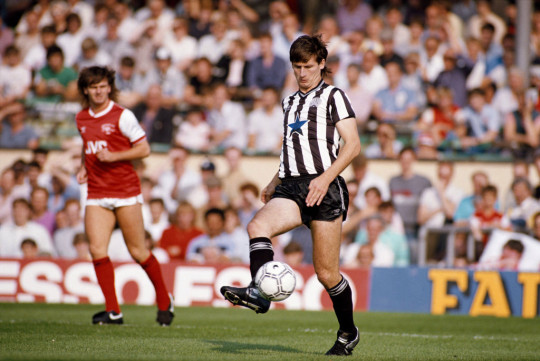
Roeder controls the ball while Charlie Nicholas looks on – September 1985 at Highbury (Photo by David Cannon/Allsport/Getty Images)
Roeder played 217 times for Newcastle prior to Watford acquiring his services in June 1989. By this time a veteran defender, he was looking to move into coaching roles, and while in a leadership position as captain, the coaching element was encouraged by Watford in the reserves. In the early 90s he was mentioned in the tabloids as being lined up to be Gazza’s mentor in Italy when his ex-magpie colleague moved to Lazio. Claiming it was all set and Glenn was going to leave Watford and take his whole family to Italy with him, as he schemed to assist Gazza.
As with most tabloid stories it did not come to fruition but did have an element of truth to it, as Roeder seemingly had agreed to the role, but changed his mind after too many nightlife indiscretions. Roeder remained at Watford, making 86 appearances before leaving in February 1992. He returned for a brief period to Brisbane Road near the end of his playing career, where he had been on a trial since January, reunited with the club who gave him his professional break, he ended with – 123 (more as this is league only) apps in his two stints at Orient.
Gillingham offered him a player-manager role in 1992/93 and after keeping them in the Football League, moved again to Watford this time as manager between 1993-1996, where he gave goal machine, Kevin Phillips his debut in league football. A period outside management saw him help out at Burnley for a season with Chris Waddle, and later in the England set up under Glen Hoddle during and around the 1998 World Cup.
Harry Redknapp brought him into his managerial team at his boyhood club West Ham in 1999, and after Redknapp’s departure in 2001 was made manager, leading them to seventh place in the top flight in the 2001/02 season. A brain tumour was diagnosed in April 2003 led to operations and after leaving West Ham, recuperation away from work.
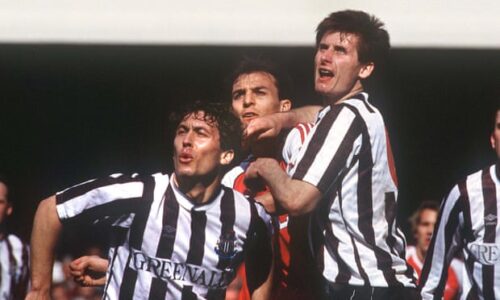
Roeder and Kenny Sansom repel Steve Bould, with Paul Merson looking on in April 1989. (Photograph: Colorsport/Shutterstock)
He came back to Newcastle in 2005 as the academy head, and then in February 2006 became manager. He led the team to win the Inter Toto cup in 2006:- the first manager to win a trophy for NUFC since Joe Harvey in 1969. Very popular on Tyneside continuing on from his playing days he gave Tim Krul and Andy Carroll debuts but left at the end of the 2006/07 season. Manager at Norwich between 2007-09, he also later took on advisory roles at Sheffield Wednesday and Stevenage.
All reports speak of his kindness and decency, as Howard Wilkinson eloquently stated after news of his passing:
“Glenn was such an unassuming, kind gentleman who demonstrated lifelong dedication to the game. Not one to court headlines, his commitment and application to his work at all levels warrants special mention. Football has lost a great servant today and our sincere condolences go to Glenn’s family and friends.”
Glenn Roeder died on 28 February 2021, succumbing to the brain tumour which he had fought for 18 years.
http://toon1892.com/detail_manager.php?id=25
https://www.whufc.com/club/history/managers/glenn-roeder
https://www.watfordfc.com/news/glenn-roeder-1955-2021
https://www.theguardian.com/football/2021/feb/28/former-west-ham-manager-and-england-coach-glenn-roeder-dies-aged-65
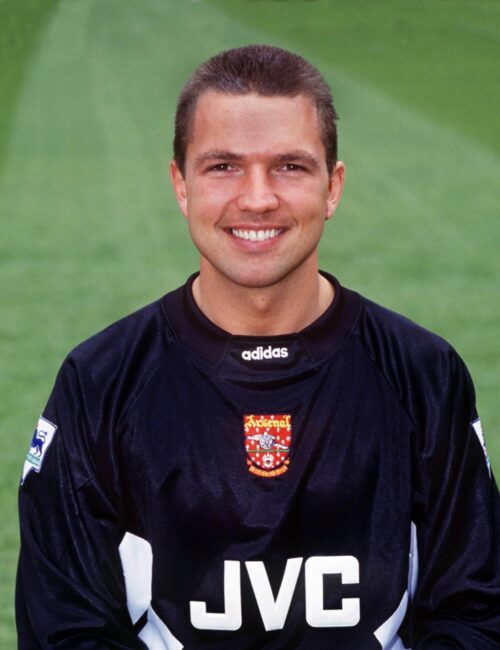
Alan Miller: The Arsenal 1984-1994
A popular reserve keeper at Highbury, he was equally admired at all his clubs, and in particular by both fans and his fellow professionals at Plymouth, Middlesbrough and West Bromwich Albion.
Born on 29 March 1970 in Epping, Miller played for Essex Schoolboys, was an England Schoolboy international, and a graduate in the inaugural intake at the FA National School of excellence at Lilleshall. Indeed he was the first Lilleshall attendee to gain international honours for England being picked for the U21 side in 1988, for whom he made an overall total of four appearances.
Arsenal signed him in July 1984 as a schoolboy, and apprenticed in July 1986 he was taken on by the club as a professional in May 1988. He appeared regularly in the youth and reserves sides, acquiring the nickname of ‘Max’ from Pat Rice after the popular music hall blue comedian, Max Miller.
Miller was an integral part of a tight goalkeeping unit at Arsenal coached by Bob Wilson, first as cover for John Lukic, and then David Seaman. Tall at 6′ 3” with great agility, solid handling skills and a friendly nature, the presence of both two such top rate keepers in Lukic and then Seaman denied him the chance to establish himself at Highbury.
On loan at Plymouth during the 1988/89 season he made a big impact during the 15 games he appeared for Argyle.
Miller will go down as a serious contender for the best ever loan player to grace Home Park after a sparkling 15-game spell for the club. The goalkeeper was brought to the Westcountry on loan from Arsenal in 1988, and was an instant hit.
From the GreenOnScreen.co.uk player biography
In March 1991 he had a back operation and the club bought in Jim Leighton on loan for the rest of the season as reserve to Seaman. Further loan spells came during the 1991/92 seasons first with West Bromwich Albion and latterly with Birmingham City.
His Arsenal debut came on 21 November 1992 as a second half substitute at Elland Road when David Seaman was injured with a bruised hip and replaced by George Graham with Miller in the 52nd minute. That Leeds side on the day remarkably featured four ex-Gunners: John Lukic, David Rocastle, Lee Chapman and Chris Whyte.
Back up to Seaman in 1993 for both the League Cup and FA Cup final victories at Wembley, and again in 1994 European Cup Winners Cup at the Parken Stadium in Copenhagen. Three days after the ECWC triumph he made his last competitive appearance for Arsenal in a game at Newcastle on 7 May 1994.
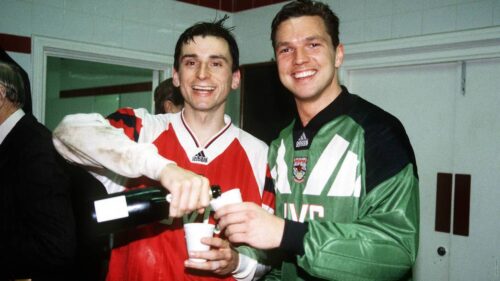
Miller celebrating with goal scorer Alan Smith after the ECWC final!
He made eight competitive first team appearances for the Gunners, in which he conceded 10 goal and kept three clean sheets. Additionally he play in 64 youth games and 131 Reserve matches, in which time as well as his first team winners’ medals, he won winners’ medals in the FA Youth Cup in 1987/88 and Combination Championship in 1989/90.
On 8 August, a few months after the memorable European night he moved to Middlesbrough for £325,000. While at Boro he was initially given the no. 1 shirt, and was part of the team that achieved promotion to the Premier League in 1995. He returned to Highbury at the start of the 1995/96 season receiving a splendid reaction from the Highbury faithful.
When he made a Premier League return at the beginning of the 1995/96 season he was so happy that he got such a great reception from the Arsenal fans. He loved the supporters and genuinely felt a great connection with them.
Letter from his family to Arsenal after his sad death.
But as time went on he was replaced between the sticks which culminated in November 1996 with him being placed on the transfer list at his own request, which in turn led to loans to Huddersfield, Grimsby and WBA again in 1997.
The loan became a full transfer from Middlesbrough, for whom he had made 64 appearances, to WBA in the summer of 1997. Miller was so impressive in his first season he was picked for the PFA First Division (now Championship) Select side chosen by his peers in 1997/98. His status as a Baggie cult hero on the terraces was confirmed when he lifted his shirt to reveal a ‘boing boing’ t-shirt during a 1-0 win over bitter rivals Wolves.
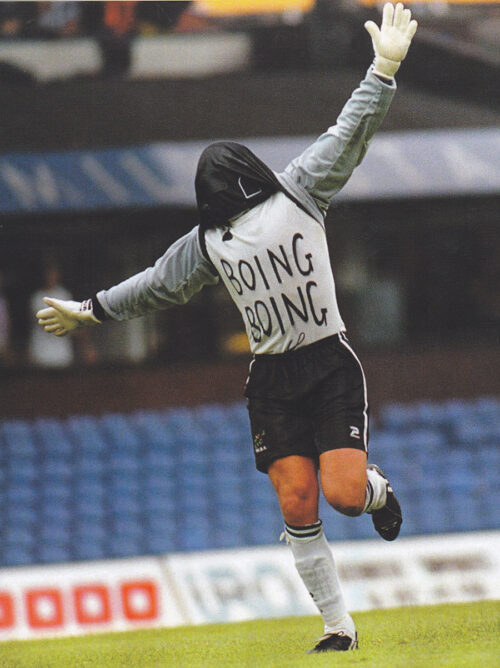
After being first choice for three seasons his back injury re-appeared which meant he lost his number one role and, after a cumulative total of 108 appearances for WBA, was consequently transferred to Blackburn Rovers in 2000. Rarely appearing at Blackburn, Alan had further loans at Bristol City, Coventry City and St Johnstone. However owing to injuries he was recalled to the Blackburn bench for the 2002 League Cup Final picking up another winners’ medal as a reserve keeper in a final!
Unfortunately his recurring back injury, which was the same as that operated on in 1991 while at Arsenal, forced him to retire in 2003. Whereupon he moved to Mallorca for a number of years running a holiday business, before becoming a pub landlord of the Jockey pub in Burnham Market, and then after playing for the Holkham Cricket club, to Holkham estate as business development manager at Holkham Hall. A keen horse racing fan, he owned some horses and loved dogs, shown as he won awards for turning a cafe in the Holkham Estate into a dog friendly concern.
Ian Wright, Lee Dixon, David Seaman, Bob Wilson, David Hillier, Michael Thomas Ray Parlour, Perry Groves – a broad range of ages from players all paid immediate and heartfelt tributes to Miller.
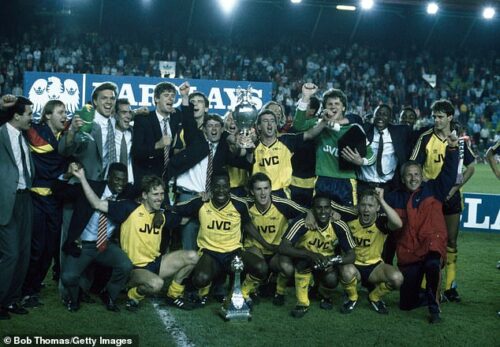
Miller on the left (his head is on the B of Barclays) next to Steve Morrow at Anfield
The reaction to Alan Miller’s sad passing from Arsenal fans tells you something about being an Arsenal Man. Only a handful of first-team appearances but Arsenal through and through and loved as a result. Immortalised at Anfield 89 on the touchline with Steve Morrow in their suits.
WBA celebrated the life of Alan Miller on 15 October 2021 in their Championship fixture against another of his former sides, Birmingham City. A minute’s applause was held ahead of kick-off with players from both sides also wearing black armbands.
Alan Miller died on 3 June 2021, suddenly of a heart attack.
https://www.greensonscreen.co.uk/gosdb-players2.asp?pid=576&scp=1,2,3,4,5,6,7
https://www.wba.co.uk/news/albion-celebrate-life-alan-miller-against-birmingham
https://www.edp24.co.uk/news/obituaries/goalkeeper-and-norfolk-estate-manager-alan-miller-dies-8026970
https://www.arsenal.com/news/message-family-alan-miller
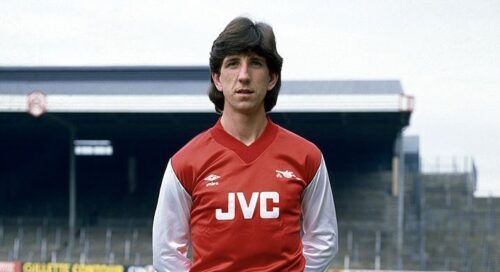
Paul Mariner: The Arsenal 1984-86
An old school centre-forward, and occasional emergency centre-half, the England International revitalised Arsenal at the end of 1983/84 and was part of a great attacking team at the start of 1984/85.
Born 22 May 1953 at Farnworth, Bolton he was a no nonsense target man, with a rare ability to bring other strikers into the game. Starting in junior football for St Gregory’s Boys Club, Paul was noted at Chorley United in the Lancashire League during the 1972/73 campaign when spotted by Plymouth Argyle scouts and they persuaded him to move to the Third Division Devon club for £6,000 in May 1973. He made an immediate impression at Home Park and in 1974/75 helped the Greens to promotion into Division Two (now Championship). Overall he made 155 appearances and scored 61 times, before Bobby Robson signed him for Ipswich Town in October 1976 for £200,000 plus add-ons dependent on future England selections.
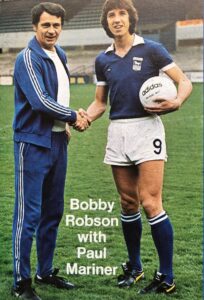
Bobby Robson Welcomes Paul Mariner to Ipswich!
At the Suffolk club he scored 139 goals in 339 games in a golden era under Bobby Robson in which they won the FA Cup in 1977/78 and UEFA Cup in 1980/81. Of course the FA Cup final win came at the expense of Arsenal, though only the most churlish of Gooners would deny that Ipswich fully deserved the victory on the day.
After being transfer listed by Ipswich he was bought for £150,000 on 9 February 1984 by Don Howe who was well aware of Mariner’s talent as he coached him at the England national team. The 599th player to don the famous red and white shirt, his debut came on 18 February 1984 at Highbury partnering Charlie Nicholas and Tony Woodcock upfront in a 1-1 draw against Aston Villa. This attacking triumvirate ensured the team moved from 14th at the time of Mariner’s arrival to finish the season sixth. Better was to come in the next campaign as the Gunners topped the league into November 1984, where the Arsenal were a revelation playing some scintillating stuff, which many believed was the best the club had played since the 71 double side.
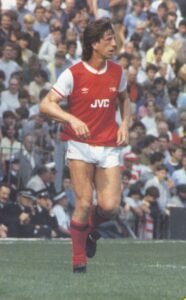
Mariner strolling around the Highbury pitch
But results faded and exits at Oxford United (a game Paul missed with injury) and York City in the cup competitions took the shine off the fantastic initial potential for the 1984/85 season. The next season he was blighted by an Achilles heel injury which saw him only play a handful of matches with his final appearance seeing him come off the bench against Nottingham Forest on 8 April 1986. Mariner left on a free transfer in August 1986 to Portsmouth having made 70 appearances and notching 17 goals for the Gunners.
At Portsmouth, though in his twilight playing years, he assisted the side into the top flight after a successful 1986/87, and consequently received a great reception from the North Bank on his return to Highbury in August 1987. However, the 6-0 drubbing the Hampshire side received did not auger well, and sure enough Pompey lasted only a season in the First Division before relegation back to the Second Division.
After 9 goals in 66 games for Pompey, Paul signed on for Naxxar Lions of Malta at the end of the 1987/88 season. He remained playing for the Maltese side for a number of years, commuting weekly from his home in Lavenham, near Ipswich, once a week to appear for the Maltese Premier League outfit. From the Summer of 1989 he would also go to the USA as player-coach for Albany Capitols, and later the San Francisco Hawks.
Keen to stay in football he coached at Bolton School but moved to America to coach youths in locations such as Arizona and Lake Placid, and also went worldwide to non-football nations such as Japan. He assisted at Harvard and New England Revolution before being appointed Plymouth Argyle manager during a turbulent off field time in 2009/2010. Mariner ended his stint over the Atlantic with a few years at Toronto after he left Home Park.
He also had a successful international playing career, scoring 13 goals in 35 England appearances in eight years, between 1977 and 1985, including the Euro 80 and World Cup 82 tournaments.
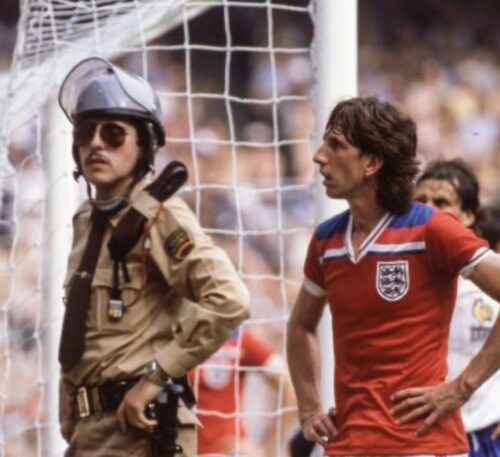
Mariner Strikes a Pose at the 82 World Cup Finals
A highly popular character seemingly liked by all supporters, irrespective of club affiliation, Paul Mariner died on 9 July 2021 of brain cancer, aged 68.
Book signing event at the Tollington before the Villa game on Friday 22 October from 16:00
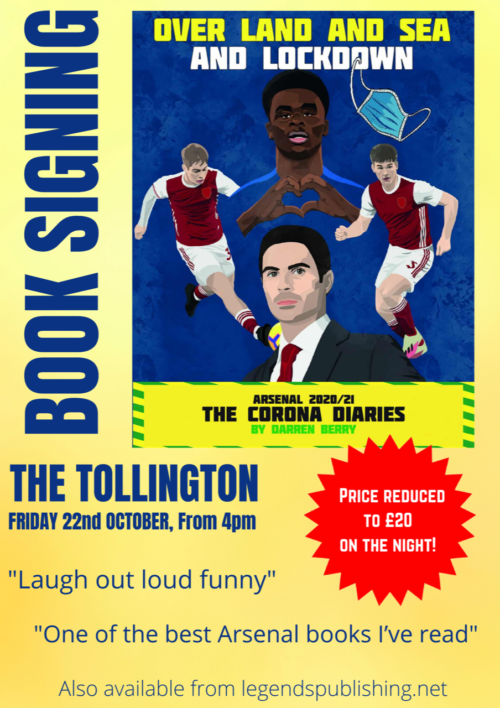
If you haven’t bought Over Land And Sea And Lockdown yet please do. It’s brilliant, Darren Berry is one funny f*cker and a great writer. I love it – Bam @ArsenalHomerton
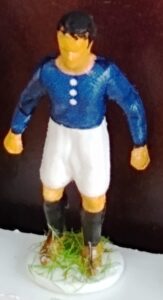
Jacky Mordue
Kit from 1907/1908 season
Position: Outside Right
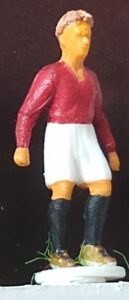
The Captain: Percy Sands
Kit from 1903/1904 promotion season
Position: centre/half back
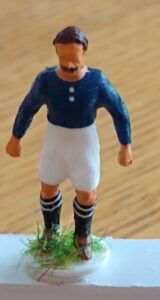
Steve Theobald: a true Arsenal stalwart
Kit from 1908/1909 season
Position: half back